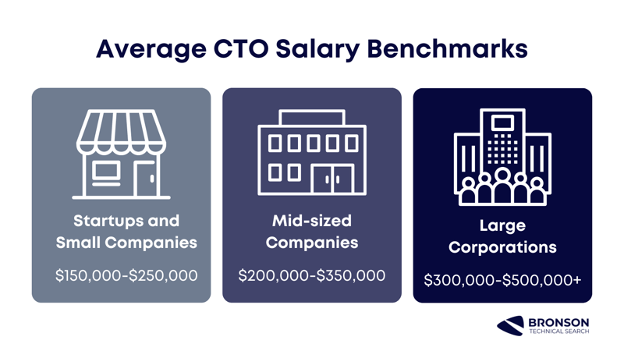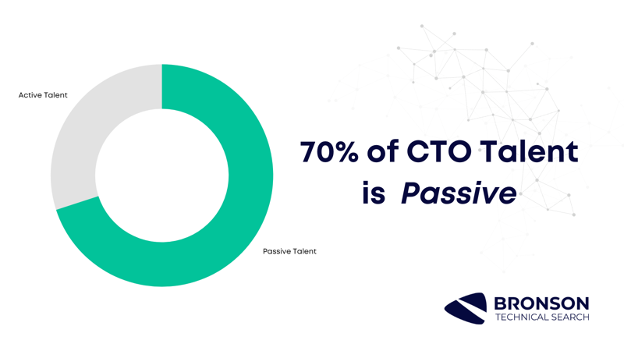
Learn how to hire a CTO (Chief Technology Officer) effectively with this comprehensive guide. Explore compensation, qualifications, and steps to hire a CTO for your company.
A great CTO does more than manage IT—they shape the future of the company, foster a culture of innovation, and ensure cybersecurity and strategic planning are top priorities. They play pivotal roles in product development and overall tech strategy.
However, finding a top-notch CTO is challenging, whether you’re an SMB or a Fortune 500. Competition for the best tech talent is fierce. Complicating things further, CTOs are job-hopping at a higher rate. In 2021, 56% of technology executives switched employers.
This guide covers everything you need to know, from defining the CTO role and necessary qualifications to different hiring models and working with a search firm. Follow these steps to hire a CTO who will drive technological excellence and help your company thrive.
CTO Job Description
A CTO’s role can vary significantly depending on the company’s size, industry, and stage of development. However, some common responsibilities include:
- Technology Strategy: Develop and implement the company’s technology strategy to ensure alignment with business goals.
- Innovation: Drive innovation and keep the company ahead of technological trends.
- Leadership: Lead and manage the IT department, including hiring, training, and mentoring staff.
- Product Development: Oversee the development and deployment of products and services.
- Security: Ensure the security of the company’s data and IT systems.
- Budget Management: Manage the technology budget and ensure cost-effective solutions.
CTO Qualifications
When hiring a CTO, consider the following qualifications:
- Educational Background: A degree in computer science, engineering, or a related field.
- Experience: Significant experience in technology leadership roles, preferably within your industry.
- Technical Skills: Proficiency in relevant technologies and a strong understanding of software development, data management, and cybersecurity.
- Leadership Abilities: Proven track record of leading and managing tech teams.
- Strategic Thinking: Ability to align technology with business goals and drive innovation.
- Communication Skills: Excellent communication skills to effectively interact with other executives, stakeholders, and team members.
Steps to Hiring a CTO
- Define the Role: Clearly outline the responsibilities, qualifications, and expectations for the CTO position.
- Create a Job Description: Develop a comprehensive job description that attracts the right candidates.
- Search for Candidates: Use various channels, including job boards, social media, and professional networks, to find potential candidates.
- Screen Applicants: Review resumes and cover letters to shortlist candidates.
- Interview Process: Conduct multiple rounds of interviews to assess technical skills, cultural fit, and leadership abilities.
- Reference Checks: Contact references to verify the candidate’s experience and capabilities.
- Offer and Negotiation: Extend an offer and negotiate terms of employment, including salary, benefits, and equity if applicable.
- Onboarding: Ensure a smooth transition and integration into the company.
Compensation

The average Chief Technology Officer salary in the United States is $303,528 as of 2024. However, this can range significantly. You can use the following as rough guidelines on salary expectations, depending on company size:
- Startups and Small Companies: $150,000 – $250,000 per year.
- Mid-Sized Companies: $200,000 – $350,000 per year.
- Large Corporations: $300,000 – $500,000+ per year.
In addition to fixed salary, it is recommended that companies looking to hire a CTO offer other forms of compensation, such as bonuses, equity (e.g., stock options), and a comprehensive benefits package.
Other perks and incentives like flexible work arrangements, relocation assistance, and professional development can be instrumental in attracting top CTOs in the tight race for tech talent.
Different Ways to Hire a CTO
Active vs Passive CTO Talent

In the competitive landscape of hiring a Chief Technology Officer (CTO), understanding the distinction between active and passive talent is crucial. Active candidates are actively seeking new opportunities, while passive candidates are not actively looking but could be open to the right opportunity.
Neglecting passive talent means missing out on a vast pool of potential candidates who might bring unique skills and experiences to the role. Working with a technology search firm can be instrumental in unlocking passive talent.
Specialist firms like Bronson Technical Search have extensive technical talent networks and resources to identify and engage with passive candidates who may not be reachable through traditional job postings. By leveraging their expertise, companies can access a broader talent pool, increase the likelihood of finding the ideal CTO candidate, and ultimately, drive innovation and success within their organization.
Hire a CTO for a Startup
Will your startup be the next unicorn?
With the right tech leadership in place, it could be.
Hiring a CTO for a startup comes with unique challenges and considerations. Startups often require a CTO who is not only technically proficient but also willing to take on multiple roles and work in a fast-paced, high-pressure environment.
At Bronson Technical Search, there are two key attributes we look for when identifying CTO candidates for startup clients:
- Look for Versatility: A startup CTO needs to wear many hats, so look for candidates who have a broad skill set.
- Cultural Fit: Ensure the candidate aligns with the startup’s culture and values.
Many startups opt for fractional, or part-time CTOs to access top talent at a lower cost.
Fractional CTOs can be a great addition to a startup, even if the company already has a full-time CTO in place.
Why?
It’s more common than you’d think: A more experienced CTO can mentor the in-house executive, bring fresh perspectives, and split the workload.
Startups can offer equity as part of the compensation package to attract top talent, even in early stages.
Hire a CTO Full-time
A full-time CTO is ideal for companies that need a dedicated leader to oversee their technology strategy and implementation. This approach provides stability and a long-term commitment to the company’s goals.
Hire a Fractional CTO
A fractional CTO works part-time or on a contract basis. This model is suitable for smaller companies or startups that require high-level expertise but cannot afford a full-time salary. A fractional CTO can provide strategic guidance without the financial burden of a full-time executive.
CTO-as-a-Service
CTO-as-a-Service is an emerging model where companies can hire a CTO on a subscription basis. This approach offers flexibility and access to top-tier talent without the need for a long-term commitment. It’s ideal for projects that require short-term expertise or companies in transition.
Working with a CTO Search Firm
Partnering with a CTO search firm can streamline the hiring process and ensure you find the best candidate for your company. Here’s how a search firm can help:
- Expertise: Search firms have deep industry knowledge and understand the specific requirements of a CTO role.
- Network: They have access to a vast network of potential candidates, including passive jobseekers who might not be actively looking for new opportunities.
- Screening: Search firms conduct thorough screenings and assessments to present only the most qualified candidates.
- Efficiency: They can expedite the hiring process, saving your company time and resources.
Onboarding Your New CTO
Successfully onboarding a new Chief Technology Officer (CTO) ensures they can start making impactful contributions from day one. A structured and comprehensive onboarding process helps the CTO acclimate to the company’s culture and operations while improving retention.
First Month
- Detailed Project Briefings: Organize briefings on critical projects and initiatives, ensuring the CTO meets with project leads.
- Set Clear Expectations: Discuss and set short-term goals and key performance indicators (KPIs) to align efforts with company priorities.
- Team Meetings: Facilitate team meetings where the CTO can introduce themselves and build rapport with the IT department and other relevant teams.
- Access to Historical Data: Provide access to historical data, previous strategies, and performance reports for insights into past successes and areas needing improvement.
First 90 Days
- Regular Check-Ins: Schedule regular check-ins with the CEO or direct supervisor to discuss progress, challenges, and feedback.
- Stakeholder Feedback: Collect feedback from key stakeholders and team members regarding the CTO’s integration and initial impact.
- Strategic Planning Sessions: Involve the CTO in strategic planning sessions to help shape the future technology roadmap.
- Leadership Development: Offer opportunities for leadership development, such as executive coaching or mentorship programs.
Continuous Integration
- Ongoing Support: Provide ongoing support and resources, including additional training and access to industry conferences.
- Performance Reviews: Conduct formal performance reviews at the end of the first 90 days and at regular intervals thereafter to assess impact and discuss long-term goals.
- Foster Collaboration: Encourage a culture of collaboration and innovation, empowering the CTO to lead technological advancements.
- Celebrate Milestones: Recognize and celebrate milestones and achievements to foster a sense of accomplishment and motivate continued success.
By following these steps, you can ensure a smooth and effective onboarding process for your new CTO, setting them up for success and enabling them to make significant contributions to your organization’s growth and innovation.
Hire a CTO Today
Hiring a CTO is a strategic decision that can significantly impact your company’s success. Whether you opt for a full-time, fractional, or CTO-as-a-service model, it’s crucial to find a candidate who aligns with your company’s vision and goals. Consider partnering with a CTO search firm like Bronson Technical Search to leverage our expertise and network. With the right approach, you can hire a CTO who will drive innovation, ensure technological excellence, and contribute to your company’s growth.
For more information on how we can assist you in finding the perfect CTO for your organization, contact Bronson Technical Search today.

By Colin Kieran, Managing Partner, Bronson Technical Search
FAQs on Hiring a CTO
A Chief Technology Officer (CTO) is a senior executive responsible for overseeing the technology strategy, development, and implementation within an organization. They play a crucial role in driving innovation, managing IT infrastructure, and ensuring that technology aligns with business goals.
Hiring a CTO is essential for companies that rely on technology to drive their business. A CTO can provide strategic direction, manage tech teams, oversee product development, and ensure the security and efficiency of IT systems, ultimately contributing to the company’s growth and success.
A CTO should have a strong educational background in computer science, engineering, or a related field. They should possess significant experience in technology leadership roles, have proficiency in relevant technologies, demonstrate strategic thinking, and exhibit excellent leadership and communication skills.
The primary responsibilities of a CTO include developing and implementing technology strategies, driving innovation, leading and managing IT teams, overseeing product development, ensuring cybersecurity, and managing the technology budget.
The steps to hiring a CTO include defining the role, creating a job description, searching for candidates, screening applicants, conducting interviews, performing reference checks, extending an offer and negotiating terms, and ensuring a smooth onboarding process.
The time it takes to hire a CTO can vary depending on the company’s requirements, the availability of candidates, and the thoroughness of the hiring process. It typically takes several weeks to a few months to complete the process.
A full-time CTO is a dedicated executive who works exclusively for your company and is responsible for overseeing all technology-related aspects. A fractional CTO, on the other hand, works part-time or on a contract basis, providing strategic guidance and expertise without the financial commitment of a full-time executive.
CTO-as-a-Service is a model where companies hire a CTO on a subscription basis. This approach offers flexibility and access to top-tier talent for short-term projects or during transitional periods without the need for a long-term commitment.
Working with a CTO search firm can streamline the hiring process and ensure you find the best candidate. Search firms have deep industry knowledge, extensive networks, and the expertise to conduct thorough screenings and assessments, presenting only the most qualified candidates.
Search firms use various methods to find candidates, including leveraging their professional networks, accessing databases of potential candidates, and using advanced recruitment techniques. They also reach out to passive job seekers who may not be actively looking for new opportunities.
The cost of hiring a CTO can vary widely depending on the candidate’s experience, the industry, and the company’s location. In addition to salary, consider other costs such as benefits, bonuses, equity, and possibly relocation expenses.
While full-time CTOs can be expensive, startups have options such as hiring a fractional CTO or using CTO-as-a-Service to access high-level expertise without the financial burden of a full-time executive.
- All
- AI in Recruitment
- Blog Posts FAQs
- CDO Executive Search
- CIO Executive Search
- CSO Executive Search
- Cybersecurity Staffing
- Employers
- FAQs on Hiring a CTO
- How to Become a Chief Data Officer
- Retained Search vs Contingent Search
Diversity and inclusion are core values at Bronson Search. We are committed to presenting a diverse slate of candidates for every executive search, including CSO roles. Our goal is to help our clients build inclusive leadership teams that reflect the diverse perspectives and experiences needed to drive innovation and success in today’s rapidly evolving business landscape.
Bronson Search operates in the United States and Canada, and can source candidates from our nationwide talent pool to meet your needs. In addition, we can filter searches based on specific cities or states/provinces.
Absolutely. Our support doesn’t end with the placement of a candidate. We provide assistance and guidance during the onboarding process to ensure a smooth transition for the new hire. Additionally, we offer resources and support to help integrate the new CSO into your organization’s culture and operations.
Confidentiality is paramount in all our executive searches. We understand the sensitivity of hiring for key leadership positions, especially in the realm of security. We take rigorous measures to safeguard the confidentiality of both our clients and candidates throughout the entire process.
Our candidates for CSO and CISO roles often have extensive experience in cybersecurity, risk management, and leadership roles within the technical domain. They typically hold advanced degrees in fields such as computer science, information technology, or cybersecurity, along with relevant certifications such as CISSP (Certified Information Systems Security Professional) or CISM (Certified Information Security Manager).
Our specialization in technical roles, extensive network, proven track record, and customized approach are some of the key factors that set us apart. We are dedicated to delivering exceptional results and providing unparalleled support to our clients throughout the hiring process.
We have experience working across various industries, including technology, finance, healthcare, and manufacturing, among others. Our expertise in technical talent acquisition allows us to cater to the unique needs of each industry.
While full-time CTOs can be expensive, startups have options such as hiring a fractional CTO or using CTO-as-a-Service to access high-level expertise without the financial burden of a full-time executive.
The cost of hiring a CTO can vary widely depending on the candidate’s experience, the industry, and the company’s location. In addition to salary, consider other costs such as benefits, bonuses, equity, and possibly relocation expenses.
Search firms use various methods to find candidates, including leveraging their professional networks, accessing databases of potential candidates, and using advanced recruitment techniques. They also reach out to passive job seekers who may not be actively looking for new opportunities.
Working with a CTO search firm can streamline the hiring process and ensure you find the best candidate. Search firms have deep industry knowledge, extensive networks, and the expertise to conduct thorough screenings and assessments, presenting only the most qualified candidates.
CTO-as-a-Service is a model where companies hire a CTO on a subscription basis. This approach offers flexibility and access to top-tier talent for short-term projects or during transitional periods without the need for a long-term commitment.
A full-time CTO is a dedicated executive who works exclusively for your company and is responsible for overseeing all technology-related aspects. A fractional CTO, on the other hand, works part-time or on a contract basis, providing strategic guidance and expertise without the financial commitment of a full-time executive.
The time it takes to hire a CTO can vary depending on the company’s requirements, the availability of candidates, and the thoroughness of the hiring process. It typically takes several weeks to a few months to complete the process.
The steps to hiring a CTO include defining the role, creating a job description, searching for candidates, screening applicants, conducting interviews, performing reference checks, extending an offer and negotiating terms, and ensuring a smooth onboarding process.
The primary responsibilities of a CTO include developing and implementing technology strategies, driving innovation, leading and managing IT teams, overseeing product development, ensuring cybersecurity, and managing the technology budget.
A CTO should have a strong educational background in computer science, engineering, or a related field. They should possess significant experience in technology leadership roles, have proficiency in relevant technologies, demonstrate strategic thinking, and exhibit excellent leadership and communication skills.
Hiring a CTO is essential for companies that rely on technology to drive their business. A CTO can provide strategic direction, manage tech teams, oversee product development, and ensure the security and efficiency of IT systems, ultimately contributing to the company’s growth and success.
A Chief Technology Officer (CTO) is a senior executive responsible for overseeing the technology strategy, development, and implementation within an organization. They play a crucial role in driving innovation, managing IT infrastructure, and ensuring that technology aligns with business goals.
While both roles are critical for leveraging technology and data to support organizational goals, they focus on different aspects of information management.
A Chief Data Officer (CDO) primarily oversees the management, governance, and utilization of data assets to drive business value, ensure data quality, and promote data-driven decision-making.
On the other hand, a Chief Information Officer (CIO) is responsible for the overall technology strategy and infrastructure of the organization, including hardware, software, networks, and cybersecurity.
While the CDO focuses on maximizing the value of data, the CIO is more concerned with the broader IT landscape and ensuring that technology aligns with the organization’s strategic objectives.
Organizations can benefit from having a Chief Data Officer by gaining valuable insights from their data assets, improving decision-making processes, enhancing operational efficiency, mitigating risks, identifying new business opportunities, and driving innovation and competitive advantage in the marketplace.
Chief Data Officers often encounter challenges such as cultural resistance to data-driven decision-making, data silos, legacy systems, regulatory compliance, and talent acquisition and retention. Overcoming these challenges requires strong leadership, effective communication, and a strategic approach to data management and analytics initiatives.
Data governance is crucial for a Chief Data Officer as it ensures that data is managed, protected, and utilized in a consistent and compliant manner across the organization. Establishing robust data governance frameworks helps mitigate risks, maintain data quality, and enhance trust in the organization’s data assets.
Successful Chief Data Officers possess a diverse skill set that includes strong leadership, strategic thinking, communication, and collaboration abilities. Additionally, they should have deep expertise in data management, analytics, technology, and business acumen to effectively drive data-driven decision-making across the organization.
Becoming a Chief Data Officer typically requires a combination of education, experience, and specific skills. Many CDOs have advanced degrees in fields such as computer science, data science, or business administration. They also often have extensive experience in data management, analytics, and leadership roles within organizations.
A Chief Data Officer (CDO) is responsible for managing and leveraging an organization’s data assets to drive business growth, innovation, and efficiency. They oversee data strategy, governance, quality, and analytics initiatives to ensure that data is effectively utilized to support organizational goals and objectives.
The timeline for a retained search can vary depending on factors such as the complexity of the role, market conditions, and the availability of suitable candidates. However, it’s not uncommon for the process to take several weeks to several months to complete.
Retained search firms typically receive a portion of the fee upfront upon engagement, with the remaining balance paid upon successful placement of the candidate.
Retained search firms are prevalent in industries such as executive leadership, finance, technology, healthcare, and legal sectors, where recruiting top talent is crucial for organizational success.
Ethical considerations of AI in recruitment include:
- Ensuring fairness and transparency in AI-driven decision-making processes.
- Protecting candidate privacy and securing sensitive data.
- Mitigating biases in AI algorithms to prevent discriminatory outcomes.
- Providing transparency to candidates about the use of AI in the recruitment process.
- Reskilling and upskilling recruiters to adapt to the changing landscape of AI-driven recruitment.
- Considering the broader societal implications of AI in shaping the future of work and employment opportunities.
Small businesses can leverage AI in their hiring processes by:
- Implementing AI-powered applicant tracking systems to streamline resume screening and candidate management.
- Utilizing chatbots for initial candidate engagement and FAQ responses.
- Using AI-driven platforms for skills assessments and candidate matching.
- Leveraging predictive analytics to identify high-potential candidates.
- Adopting virtual interviewing tools to conduct remote interviews efficiently.
Yes, there are legal implications associated with using AI in recruitment, particularly regarding privacy, discrimination, and compliance with regulations such as GDPR (General Data Protection Regulation) and EEOC (Equal Employment Opportunity Commission) guidelines. Using AI for recruitment must comply with data protection laws, ensure transparency in decision-making processes, and avoid discriminatory outcomes based on protected characteristics like race, gender, or age.
Organizations can implement various strategies to mitigate bias in AI algorithms, such as:
- Ensuring diverse training data sets to prevent algorithmic bias.
- Regularly auditing and evaluating AI algorithms for fairness and transparency.
- Implementing bias detection algorithms to identify and address biased outcomes.
- Involving diverse teams in the development and testing of AI systems to bring different perspectives.
- Providing ongoing training to employees on recognizing and addressing bias in AI systems.
While AI can augment and enhance the recruitment process, it’s unlikely to completely replace human recruiters. Human touch, empathy, and understanding nuances in candidate interactions are aspects that AI cannot fully replicate. AI can assist in tasks like identifying potential candidates and analyzing data, but the final decision-making and relationship-building often require human intervention.
AI streamlines the recruitment process by automating repetitive tasks such as resume screening, candidate sourcing, and initial screening interviews. It helps recruiters focus more on strategic tasks like building relationships with candidates and clients. For example, AI-powered applicant tracking systems (ATS) like Greenhouse or Lever can efficiently parse resumes and match them with job requirements, saving recruiters significant time and effort.
- Strategic thinking: A top-tier CDO should be able to develop and execute a comprehensive data strategy that aligns with the organization’s overall goals and objectives.
- Leadership skills: A CDO must be able to lead and manage a team of data professionals and collaborate effectively with other executives and business leaders.
- Technical expertise: A CDO should have a strong technical background and be familiar with data architecture, data management, and data analytics.
- Business acumen: A top-tier CDO should understand the business context of data and be able to translate technical concepts into business terms that executives and business leaders can understand.
- Communication skills: A CDO must be able to communicate effectively with both technical and non-technical stakeholders, including executives, business leaders, and data professionals.
- Industry knowledge: A CDO should have a deep understanding of the industry and be familiar with emerging trends, technologies, and best practices in data management.
- Data privacy and security expertise: A CDO should be knowledgeable about data privacy and security regulations and best practices to ensure that the organization’s data is protected.
Overall, a top-tier CDO should possess a combination of technical expertise, leadership skills, and business acumen to develop and execute a successful data strategy that drives business success.
- Developing and implementing a data strategy: CDOs are responsible for creating and executing a comprehensive data strategy that aligns with the organization’s overall goals and objectives.
- Ensuring data quality, privacy, and security: CDOs must ensure that data is accurate, reliable, and protected from unauthorized access, theft, or breaches.
- Managing data assets: CDOs oversee the organization’s data assets, including data architecture, governance, and data lifecycle management.
- Promoting data-driven decision-making: CDOs encourage a data-driven culture within the organization, ensuring that data is used to inform business decisions and drive innovation.
- Collaborating with stakeholders: CDOs work closely with other executives, business leaders, and data professionals to ensure that data is used effectively across the organization.
- Staying up-to-date with emerging technologies and trends: CDOs must keep up-to-date with new technologies and trends in data management to ensure that the organization stays competitive in the market.
Overall, the core responsibilities of a CDO revolve around managing and leveraging data to drive business success, and they play a critical role in shaping an organization’s data strategy and culture.
Chief Data Officers (CDOs) are more important than ever before because of the exponential growth of data in today’s digital world. With the proliferation of new technologies, devices, and applications, organizations generate and collect massive amounts of data every day.
CDOs play a critical role in managing and leveraging this data to gain insights, make data-driven decisions, and drive innovation. They are responsible for developing and implementing data strategies, ensuring data quality, privacy, and security, and promoting a culture of data-driven decision-making across the organization.
CDOs enable organizations to unlock the full potential of their data assets, improve business performance, and gain a competitive edge in the market. Therefore, CDOs are essential for organizations that want to succeed in the data-driven digital economy.
The cybersecurity experts we meticulously select for our clients embody a rare fusion of skills – technical prowess, strategic acumen, leadership abilities, and communication expertise. This combination is vital in propelling your organization’s IT strategies and ensuring that technology is a cornerstone of your company’s success.
In aligning with the unique fabric of your organization – its specific environment, objectives, and culture – Bronson Technical Search rigorously seeks out the following attributes in elite CIOs:
- Technical Expertise: Our candidates possess profound knowledge in a wide array of security technologies, tools, and systems, enabling them to adeptly navigate and optimize your IT security landscape.
- Problem-Solving Skills: They have a remarkable ability to dissect and understand complex security challenges, devising and implementing effective, innovative solutions.
- Attention to Detail: These professionals exhibit meticulous attention in detecting and neutralizing potential security threats, ensuring thorough protection.
- Strong Communication Skills: They are skilled in articulating complex technical details to a diverse audience, ensuring clear understanding among both technical and non-technical stakeholders.
- Continuous Learning: Constantly updated with the latest in security trends and best practices, they maintain a cutting-edge understanding of the cybersecurity field.
- Industry Certifications: Our experts often hold prestigious certifications like the Certified Information Systems Security Professional (CISSP), Certified Ethical Hacker (CEH), and CompTIA Security+, which testify to their knowledge and commitment.
- Relevant Experience: With hands-on experience in key areas such as incident response and risk management, they bring practical, real-world insights to address your cybersecurity challenges.At Bronson Technical Search, we are dedicated to connecting you with cybersecurity professionals who are not just technically proficient, but who also align seamlessly with your organization’s ethos and drive its technological advancement.
The CIOs we handpick for clients have a unique blend of technical knowledge, strategic thinking, leadership, and communication skills to effectively drive your organization’s IT initiatives and ensure technology supports your company’s success.
Emphasizing your organization’s unique environment, goals, and culture, Bronson Technical Search looks for the following qualities in top-tier CIOs:
- Strong technical knowledge: A deep understanding of current and emerging technologies, as well as the ability to evaluate and select technology solutions that align with the organization’s goals.
- Strategic thinking: The ability to develop and implement long-term IT strategies that support the overall business objectives.
- Business acumen: A strong understanding of the organization’s business operations, challenges, and goals, and the ability to translate them into effective IT solutions.
- Leadership: Excellent leadership skills, including the ability to manage a large team, communicate effectively with stakeholders, and motivate and inspire team members.
- Financial management: The ability to manage the IT budget effectively and make decisions that balance cost, risk, and benefit.
- Innovation: Finding a CIO who can stay ahead of the curve can be difficult. In our psychometric assessments, we look for a willingness to embrace new technologies and approaches
The role of a Chief Information Officer (CIO) is to lead an organization’s information technology (IT) strategy, operations, and resources. The CIO is responsible for developing and implementing IT plans that align with the organization’s overall goals, managing the IT budget and resources, and ensuring the security and privacy of company data and systems. The CIO also works closely with other departments and stakeholders to understand their technology needs and ensure they are met.
Additionally, the CIO stays up-to-date with industry trends and advancements in technology to continually improve the organization’s use of technology to support its objectives. In short, the CIO is a strategic leader who uses technology to drive business growth and success.



